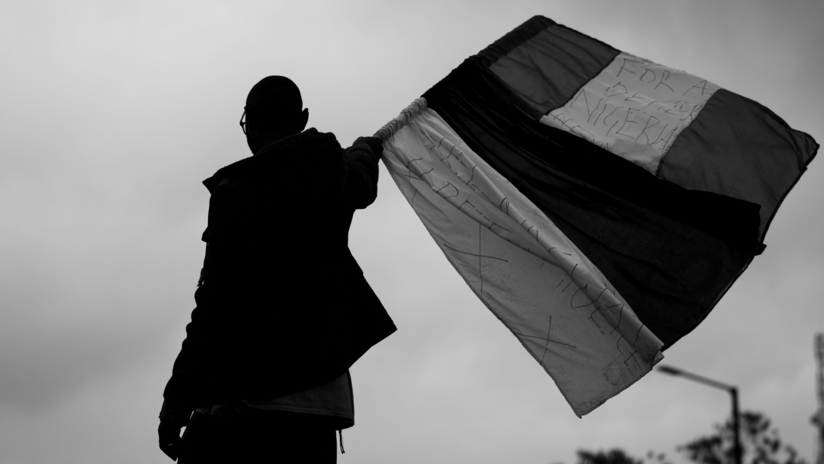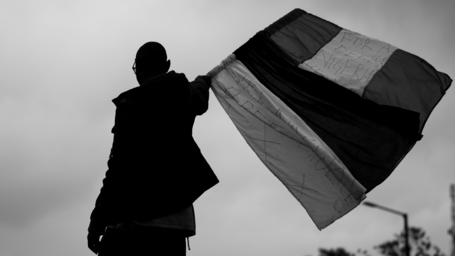As a Nigerian-American, I’ve had to witness relentless attacks on both of my cultural groups this year. The never ending police brutality and racial attacks on Black Americans made international headlines yet again, while the fight against a ruthless Nigerian police unit is becoming more known to people across the world, including myself.
Living overseas, I’m not always in the loop when it comes to affairs and issues in Nigeria. So when I saw that #EndSARS was trending on Twitter back in October, I genuinely thought that the 2003 virus made a return (because at this point, I couldn’t expect anything less from 2020).
But after browsing through the hashtags and doing research, I quickly became informed on another unfortunate human rights issue.
SARS, which stands for the Special Anti-Robbery Squad, is a Nigerian police unit. Formed in 1992, the unit was created to handle robberies, theft, kidnappings, and other serious crimes. One would think that this group would provide a sense of safety and relief to citizens, especially since it was formed during a period in Nigeria when the country underwent a crime-epidemic. Instead, it soon became the opposite of its purpose.

Throughout the past few decades, there have been increasing reports of harassment committed by SARS operatives onto citizens, with the most common form ironically being robbery. If they see somebody who they suspect has stolen something, they will interrogate them, arrest them, rob them, and in more extreme cases, abuse, assault, or even murder them.
As if these methods aren’t extreme in itself, the rate at which they detain people are disproportionately innocent, everyday citizens.
Many victims have shared their experiences online. One journalist was mercilessly beaten and arrested by officers after they noticed that he had filmed them beating a young boy. A YouTuber was arrested and kidnapped for hours on her birthday because she wore camouflage.
The harrowing list goes on, with likely hundreds of thousands of citizens with encounters with SARS who may never want to tell their story.
The primary target of these attacks are people aged from 18-40, who are commonly referred to as Nigerian youths. In recent years, these youths have protested against SARS with 2020 being the most that they have mobilized. People have shared posts on social media, peacefully protested in the streets against this police brutality, and done everything they possibly could to fight this regime.

And Tuesday, October 20th was supposed to be no different. Protestors in Lagos State, Nigeria peacefully gathered at a toll gate in the city of Lekki. For the whole day, the scene was made up of people cheering, proudly waving the Nigerian flag around as they so lively chatted and danced with strangers, enforcing the message that they are strong as a people and want better for their country.
Later on into the evening, unfortunately, their glee was met with tragedy. Nigerian soldiers were ordered to the toll gate and, unprovoked, started shooting into the crowd. People scattered, scrambling to get to safety away from the hail of bullets. Many were able to get away, but some unfortunately were hit and succumbed to their wounds that night and in the following days of civil unrest in communities around the country.
That week, I saw images that I wish I never came across, heard cries of agony I wish I never heard, and learned more about my country than I ever had in my life.
My late father always instilled a sense of pride within me and my sister to always be proud of who we are and our heritage. From the fond stories I remember him telling, to the pictures, and the videos of community gatherings, I saw a country filled with joyous citizens proud of who they are.
So to see the recordings of people in peril and discourse was disheartening. In the people that were protesting, I saw my cousins. In the fallen citizens, I saw an uncle, an auntie, a family friend.

Right now, my country is fighting for their freedom. Now more than ever, Nigerian youths are ready for a change. Many have the same momentum, but some have grown tired. If a Nigerian youth is reading this article, the person typing this along with millions around the world stand in solidarity with you. These times seem weary, but the fight for freedom and justice will be won.
May all of the Nigerians who’ve died at the hands of police brutality and injustice rest in peace. And as the saying goes, “Naija no dey carry last,” which most use as a way of saying Nigerians will finish first, or Nigerians will triumph in all circumstances. And in this fight, Nigerians will certainly triumph over these circumstances.



